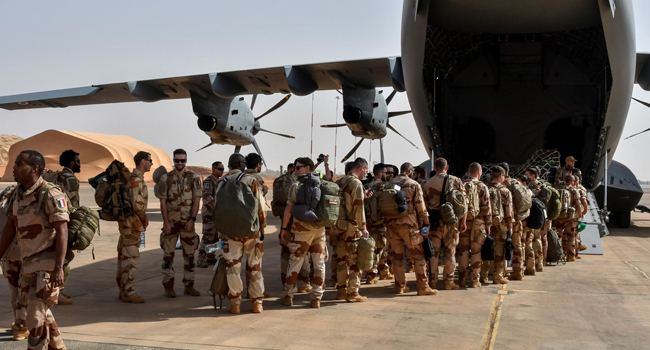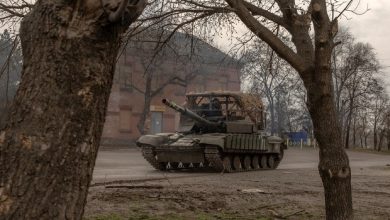Last French Troops Bow Out Of Niger Republic

The last French troops withdrew from Niger on Friday, in the latest blow to more than a decade of French anti-jihadist operations in west Africa’s Sahel region.
The French exit leaves just hundreds of US military personnel and a number of Italian and German troops remaining in the country.
France announced it would pull out its roughly 1,500 soldiers and pilots from Niger after the former French colony’s new ruling generals demanded they depart following a coup on July 26.
It was the third time in less than 18 months that French troops were sent packing from a Sahel nation, after fellow former colonies Mali and Burkina Faso following military takeovers.
All three nations are battling a jihadist insurgency that erupted in northern Mali in 2012 and spread, but their relations have nosedived with France since a string of coups in the region.
The last French soldiers took off from an airbase in the capital Niamey aboard two aircraft, according to an AFP journalist. Their destination was unclear.
“Today’s date… marks the end of the disengagement process of French forces in the Sahel,” said Niger army lieutenant Salim Ibrahim.
Some 1,000 French troops remain in neighbouring Chad, where France has based its Sahel anti-jihadist operations, but now no longer have a presence in the three main countries battling the extremists.
Ibrahim said the pullout from Niger, which started in October, included 145 flights and 15 ground convoys in total.
The French military told AFP that no equipment was abandoned, but buildings had been left in place.
Perilous Desert Routes
French President Emmanuel Macron announced in September the withdrawal of all French troops from Niger by the end of the year.
Most French troops in Niger had been stationed at the air base in Niamey.
Smaller groups were deployed alongside Nigerien soldiers to the border with Mali and Burkina Faso, where jihadist groups linked to the Islamic State group and Al-Qaeda are believed to operate.
The withdrawal was a complex operation, with road convoys having to drive up to 1,700 kilometres (1,000 miles) on sometimes perilous desert routes to Chad.
The first French road convoy of troops withdrawing from Niger arrived in Chad’s capital N’Djamena in October, after 10 days on the road.
From Chad, French troops can leave by air with their most sensitive equipment, though most of the rest will have to be moved by land and sea.
According to a source close to the matter, some of the French containers carrying equipment were to be driven from Chad on to the port of Douala in Cameroon, before being ferried back to France by sea.
– US, German troops –
Mali, Burkina Faso and Niger in September banded together in a joint defence pact to fight jihadists.
France’s former ally in Niger, overthrown president Mohamed Bazoum, remains under house arrest.
A US official said in October that Washington was keeping about 1,000 military personnel in Niger but was no longer actively training or assisting Niger forces.
The United States said earlier this month that it was ready to resume cooperation with Niger on the condition its military regime committed to a rapid transition to civilian rule.
Niger’s rulers want up to three years for a transition back to a civilian government.
Military leaders in Niamey early this month said they were ending two European Union security and defence missions in the country.
German Defence Minister Boris Pistorius visited Niger earlier this week to discuss the fate of around 120 German troops based in the country.
It was not immediately clear what would happen to Italian troops in Niger.
But an Italian diplomat has said France’s departure presents its European partners with a dilemma.
“We have a responsibility not to leave because the void would immediately be filled by the Russians,” the diplomat said.
France’s withdrawal from Mali last year left a bitter aftertaste, after the bases it once occupied in Menaka, Gossi and Timbuktu were rapidly taken over by Russia’s Wagner paramilitary group.
AFP







